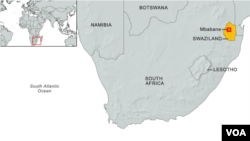JOHANNESBURG —
More than two dozen rights groups are appealing to Swaziland’s government, calling for the amendment of a terrorism act that they claim has been used to stifle peaceful opposition. Activists in Swaziland say they are aware of at least 15 arrests in the last two months, and say detainees have been beaten and given death threats.
The rights groups assert that Swaziland’s Suppression of Terrorism Act has been used to arrest peaceful opponents of the ruling party, and that the law needs to be overhauled to open up freedom of expression.
Swaziland is a politically unique animal. The tiny nation wedged between South Africa and Mozambique is Africa’s last absolute monarchy, co-ruled by King Mswati III and his mother.
The nation is technically a democracy, though political parties are banned and the king is the top executive who rules for life. Swaziland held parliamentary elections in September -- but along with the 55 legislators voters got to choose, the king got to appoint 10 members of parliament on his own and name the prime minister.
Sipho Gumedze, of the Swaziland branch of Lawyers for Human Rights, said his group is aware of 18 arrests since September.
Among that group, he said, nine people were arrested in a rural area for criticizing a longtime chief. Another three were arrested for passing out political pamphlets. And he said he had just received recent reports of five more arrests, and that those detainees said they had been beaten and overtly threatened.
The arrests set a terrible precedent in the impoverished nation, he said.
“It perpetuates the suppression of freedom of expression, freedom of conscience, freedom of association, freedom of religion," Gumedze said. "That is the motivating factor why we believe the STA ought to be amended.”
His organization is one of 26 that signed the letter sent on Tuesday to top officials, including the prime minister. Other appellants include the powerful Trade Union Congress of Swaziland and international rights groups such as Amnesty International and Human Rights Watch.
Gumedze said the petitioners are appealing to the United Nations, international donors, the Southern African Development Community and neighboring South Africa to exert pressure.
Failure to intervene, he said could directly affect South Africa if the situation worsens and Swazis start to flee, as Zimbabweans in droves did during their last major political crisis.
“In the event they do not do anything, we might find ourselves in a situation such as countries like Zimbabwe, or even our neighbor, Mozambique, which is now almost on the brink of going back to civil war because of the non-cooperation of major international players who could impose upon the head of state and government to Swaziland to be open to change," said Gumedze.
Gumedze fell short of naming who in Swaziland’s government is responsible for the arrests, but one figure, King Mswati, towers over all Swazi politics. He has ruled the nation since 1986 and has drawn intense criticism for his lavish lifestyle, which includes a dozen or more wives.
The rights groups assert that Swaziland’s Suppression of Terrorism Act has been used to arrest peaceful opponents of the ruling party, and that the law needs to be overhauled to open up freedom of expression.
Swaziland is a politically unique animal. The tiny nation wedged between South Africa and Mozambique is Africa’s last absolute monarchy, co-ruled by King Mswati III and his mother.
The nation is technically a democracy, though political parties are banned and the king is the top executive who rules for life. Swaziland held parliamentary elections in September -- but along with the 55 legislators voters got to choose, the king got to appoint 10 members of parliament on his own and name the prime minister.
Sipho Gumedze, of the Swaziland branch of Lawyers for Human Rights, said his group is aware of 18 arrests since September.
Among that group, he said, nine people were arrested in a rural area for criticizing a longtime chief. Another three were arrested for passing out political pamphlets. And he said he had just received recent reports of five more arrests, and that those detainees said they had been beaten and overtly threatened.
The arrests set a terrible precedent in the impoverished nation, he said.
“It perpetuates the suppression of freedom of expression, freedom of conscience, freedom of association, freedom of religion," Gumedze said. "That is the motivating factor why we believe the STA ought to be amended.”
His organization is one of 26 that signed the letter sent on Tuesday to top officials, including the prime minister. Other appellants include the powerful Trade Union Congress of Swaziland and international rights groups such as Amnesty International and Human Rights Watch.
Gumedze said the petitioners are appealing to the United Nations, international donors, the Southern African Development Community and neighboring South Africa to exert pressure.
Failure to intervene, he said could directly affect South Africa if the situation worsens and Swazis start to flee, as Zimbabweans in droves did during their last major political crisis.
“In the event they do not do anything, we might find ourselves in a situation such as countries like Zimbabwe, or even our neighbor, Mozambique, which is now almost on the brink of going back to civil war because of the non-cooperation of major international players who could impose upon the head of state and government to Swaziland to be open to change," said Gumedze.
Gumedze fell short of naming who in Swaziland’s government is responsible for the arrests, but one figure, King Mswati, towers over all Swazi politics. He has ruled the nation since 1986 and has drawn intense criticism for his lavish lifestyle, which includes a dozen or more wives.





